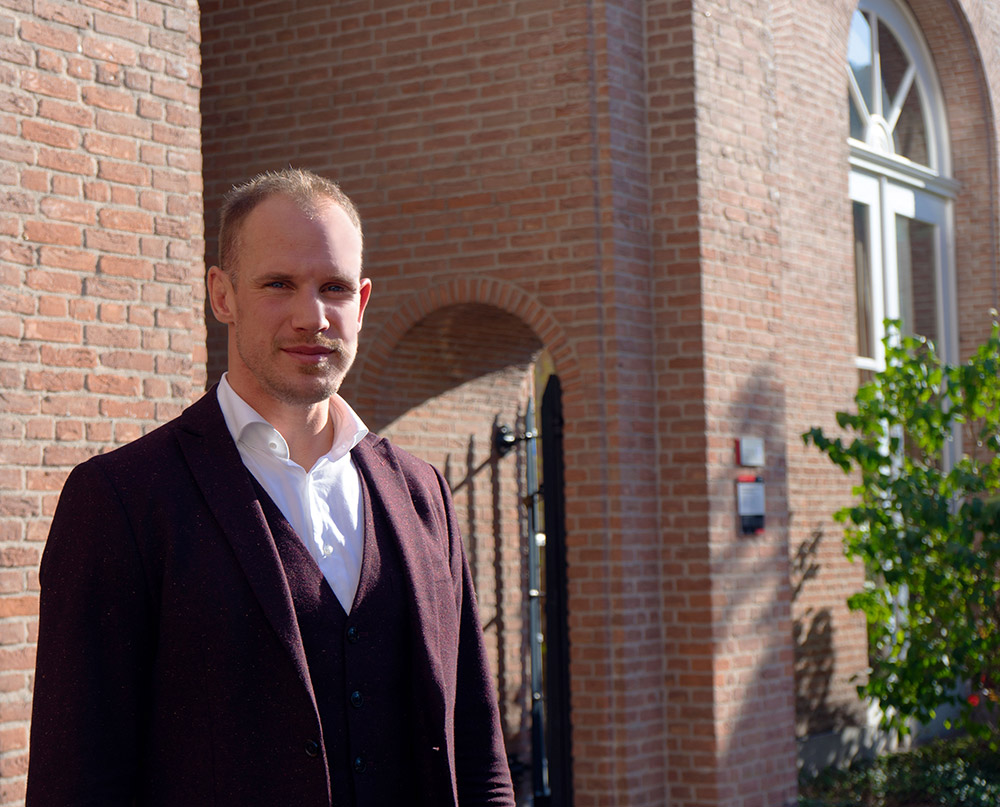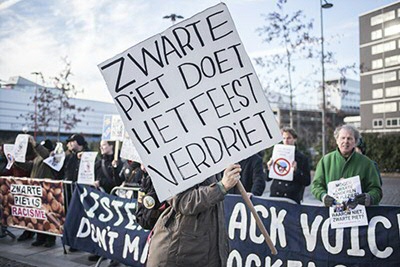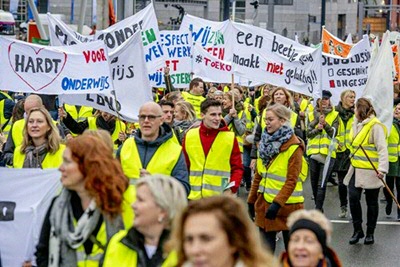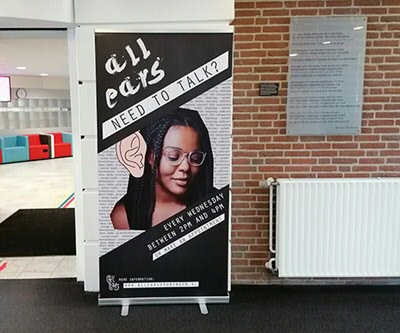Fighting for the right to demonstrate
Farmers, builders, teachers and shopkeepers who protest, Zwarte Piet (Black Pete) discussions, social dissatisfaction worldwide.... these are busy times for an expert in demonstration law. Lawyer Berend Roorda is inundated with questions from journalists, mayors and police. He gives advice, courses and likes to share his ideas. It’s busy, but he loves his job. “You get a lot of input, questions and cases, which lead to new investigations. And I'd like to share my knowledge of what can and can't be done.”
Text Merel Weijer, afd. Communicatie

Golden choice
As a little boy, Roorda was already listening to lawsuits in court. He often went with an acquaintance of his parents, who was a judge. And, he comes from a large family where there were many discussions at home. He liked that. "Holding discussions, in such a way that everyone's worth is preserved.” The fact that everyone has the room to make their point also appeals to him in the right to demonstrate. “Sometimes, this is taken too far. But everyone should be able to express themselves: a great value that we have to preserve.”
Global turmoil
It has been said that the importance of demonstrations would decrease, because of social media, for example, where people can easily express their thoughts and frustrations or dissatisfaction. But the opposite is true. “Since 2000 there has been a clear increase in the number of demonstrations worldwide,” says Roorda. Not a day goes by without a demonstration somewhere. Bolivia, Barcelona, Hong Kong, the United Kingdom, all are places in turmoil. The media seem to be playing a role in this. There's more negative news coming in. If you rely on the news, you may soon get the idea that society is becoming less safe, but that doesn’t have to be the case at all.”
Building trust
In an advisory report to the Ministry of the Interior and Kingdom Relations, Roorda and his colleagues drew attention to the situation in England, where there is a strong focus on cooperation and communication with the organization of the demonstration to ensure demonstrations run more peacefully. It is important to build a relationship of trust. “In the Netherlands we now have the Peace Unit of the Amsterdam police. They try to keep in touch with protest groups in the city. Building trust takes time, but you see it happening more and more. Now that the traditional Sinterklaas celebration is on its way, you can see that municipalities want to get a better feel for what is going on and which groups want to demonstrate, in order to be able to establish contact at an early stage.”

Safety instead of freedom
Out of fear for unrest, the emphasis has been more on safety than on freedom recently, says Roorda. “People more quickly think: I can't guarantee safety, so let's limit or prohibit demonstrations. You could see that in the name change of the Ministry of Justice, which suddenly became known as the Ministry of Security and Justice. Which, by the way, has now been reversed, because it drew many comments. It still shows a certain trend.”
Boundaries
Every mayor should always facilitate a demonstration, according to Roorda. Sometimes, however, intervention is necessary. “Each party demonstrates in a different way. It is more difficult to intervene in the case of farmers with tractors than when a few people are lying on the streets. The legal frameworks are no different, but whether or not action is taken is still a tailored matter. When imposing restrictions, a mayor should consider whether there is a need. In addition, a public prosecutor can take action against criminal offences, such as threats or sedition, in the case of the rallying cry “If you want to shoot Thierry, say bang.”
Misunderstanding
The idea sometimes exists that, in the context of freedom of demonstration and freedom of expression, you can just say anything you like. “That's incorrect,” says Roorda, “but it's also not the case that the government is allowed to interfere in advance regarding what you want to say. That would be censorship, and the prohibition of it is a very fundamental point in our rule of law.” Roorda sometimes has to deal with a lack of understanding for this position. Negative reactions occur on social media, especially when he expresses himself about controversial opinions. But he always tries to indicate that he is striving for a neutral position. “I indicate that I do not share an opinion, but it is important that there is room for that particular opinion.”
Demonstrating for the right to demonstrate
“Criticism is important, it should be cherished," he continues. It is important that mayors, public prosecutors and police keep a sharp eye on the fact that not every demonstrator is a troublemaker. They are people who make use of their democratically acquired rights and the primary task is to protect and facilitate them. I can very well imagine that this is sometimes difficult in practice. As a mayor, you want a quiet march without negative reactions. I always say: “I despise what you say, but with my life I will defend that you can say it. If I'm ever going to demonstrate for anything, it's for the right to demonstrate.”
Judo mattress and the law
Fighting with respect for each other is a familiar concept to Roorda. He was a judoka of some distinction and became Dutch champion no less than three times. Roorda was well on his way to his fourth gold medal when he badly injured his knee during the semifinal of the National Championships in 2017. It turned out to be the end of his judo career, which was a passion of his from an early age. Fighting against each other in a safe and positive atmosphere was a reason why this sport was so attractive to him. Now he goes to fitness bootcamp every morning in the Noorderplantsoen park.

All ears
Roorda is also committed to helping other people. He is a member of the Supervisory Board of the SKLO (Student Association for Worldly Organizations). Together with a number of others, he set up the All Ears programme: a facility for students who need a listening ear. “We’re not exactly being overrun, but if you can help forty or so people every year, you're doing a good job.” Roorda is a busy man: working evenings or nights is a normal thing for him. He loves to deal with everything that comes his way; fortunately, he is also learning that there are limits, limits he decides for himself.
More news
-
08 December 2025
Colourful Characters: Bert Röling
